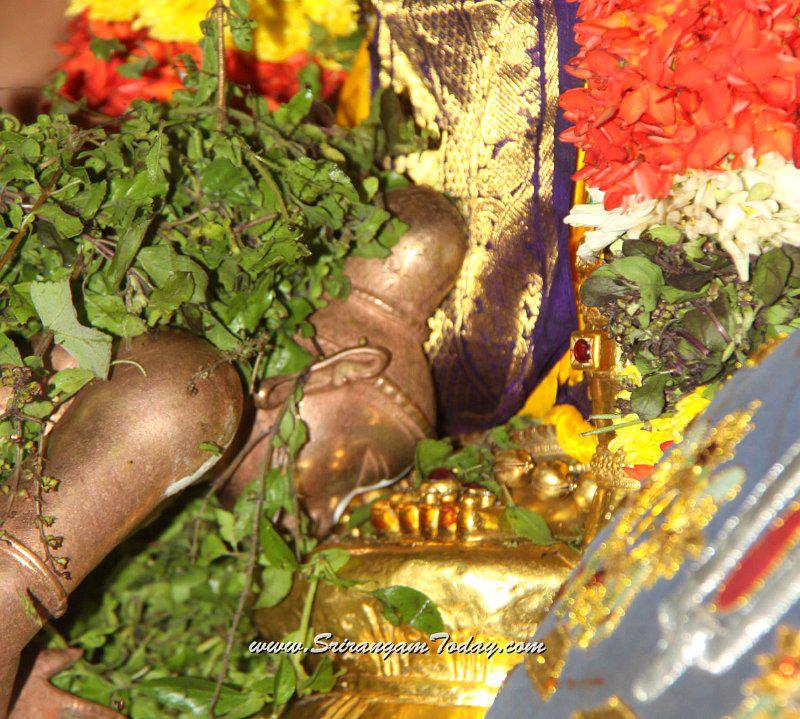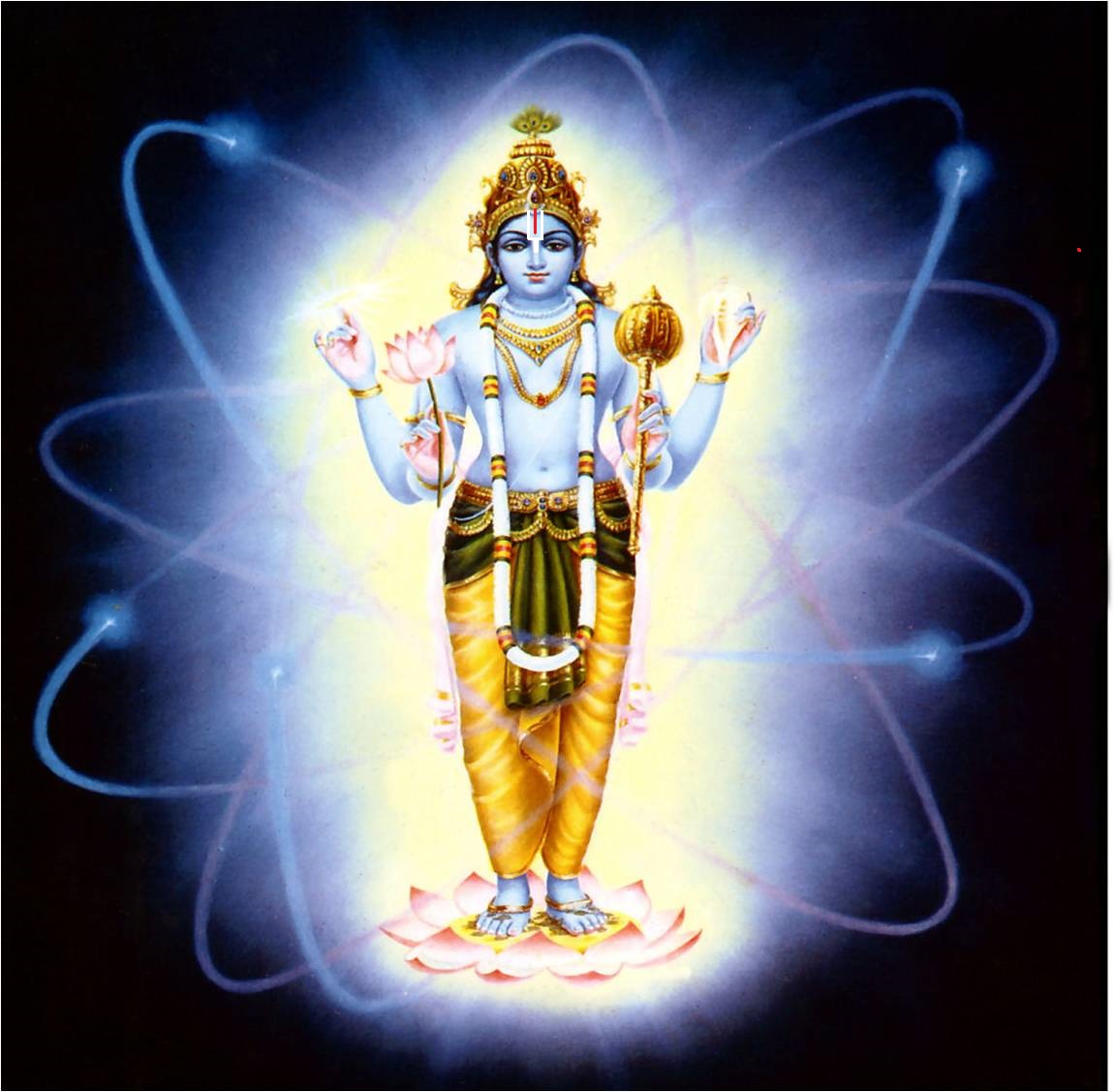srI:
srImathE satakOpAya nama:
srImathE rAmAnujAya nama:
srImath varavaramunayE nama:
Summary of each chapter in third hexade
SlOkam 17
dhEhasvarUpamAthmApthihEthurAthmaviSOdhanam |
bandhahEthurvivEkaScha thrayOdhSa udhIryathE ||
Listen
Word-by-word meaning
dhEha svarUpam – the nature of body
AthmApthi hEthu: – the means to attain the nature of jIvAthmA
Athma viSOdhanam – inquiring and knowing about AthmA
bandha hEthu: – the cause for bondage (of AthmA (soul) with achith (body))
vivEka: cha – the method to distinguish (between AthmA and achith)
thrayOdhaSE – in the thirteenth chapter
udhIryathE – spoken
Simple translation
In the thirteenth chapter – the nature of body, the means to attain the nature of jIvAthmA, the cause for bondage (of AthmA (soul) with achith (body)) and the method to distinguish (between AthmA and achith) are spoken.
SlOkam 18
guNabandhavidhA thEshAm karthruthvam thannivarthanam |
gathithrayasvamUlathvam chathurdhaSa udhIryathE ||
Listen
Word-by-word meaning
guNa bandha vidhA – how the three types of qualities namely sathvam, rajas and thamas binds in this samsAram (material realm)
thEshAm karthruthvam – the nature of such qualities being the cause for activities
than nivarthanam – the method to eliminate such qualities
gathi thrayasva mUlathvam – he (bhagavAn) being the benedictor of three types of results (best worldly wealth, enjoying one-self, attaining bhagavAn)
chathurdhaSE – in the fourteenth chapter
udhIryathE – spoken
Simple translation
In the fourteenth chapter – how the three types of qualities namely sathvam, rajas and thamas binds in this samsAram (material realm), the nature of such qualities being the cause for activities, the method to eliminate such qualities and he (bhagavAn) being the benedictor of three types of results (best worldly wealth, enjoying one-self, attaining bhagavAn) are spoken.
SlOkam 19
achinmiSrAdhviSudhdhAchcha chEthanAth purushOththama: |
vyApanAth bharaNAth swAmyAth anya: panchadhaSOdhitha: ||
Listen
Word-by-word meaning
achin miSrAdh (chEthanAth) – better than badhdha jIvAthmA (bound soul) who is attached to achit (material body)
viSudhdhAth chEthanAth cha – better than muktha jIvAthmA (liberated soul) who gave up the prAkrutha sarIram (material body)
vyApanAth – since pervading (them)
bharaNAth – since bearing (them)
swAmyAth – since being (their) master
anya: – one who is different
purushOththama: – srIman nArAyaNan who is purushOththama (best among AthmAs)
panchadhaSa udhitha: – was spoken about in fifteenth chapter
Simple translation
In the fifteenth chapter – srIman nArAyaNan who is purushOththama was spoken about. He is better than badhdha jIvAthmA (bound soul) who is attached to achit (material body) and muktha jIvAthmA(liberated soul) who gave up the prAkrutha sarIram (material body) since he is different from them and is pervading them, bearing them and being their master.
SlOkam 20
dhEvAsuravibhAgOkthipUrvikA SAsthravaSyathA |
thathvAnushtAnavigyAnasthEmnE shOdaSa uchyathE ||
Listen
Word-by-word meaning
thathva anushtAna vigyAnasthEmnE – to establish the knowledge about the truth (that is to be attained) and the practice of the process (that will acquire the goal)
dhEva asura vibhAga ukthi pUrvikA – after explaining the classification of dhEva (saintly) and asura (cruel) (among the humans)
SAsthra vaSyathA – the truth about being bound by SAsthram
shOdaSE – in the sixteenth chapter
uchyathE – spoken
Simple translation
In the sixteenth chapter – after explaining the classification of dhEva (saintly) and asura (cruel) (among the humans) to establish the knowledge about the truth (that is to be attained) and the practice of the process (that will acquire the goal), the truth about (humans) being bound by SAsthram is spoken.
SlOkam 21
aSAsthramAsuram kruthsnam SAsthrIyam guNatha: pruthak |
lakshaNam SAsthraSidhdhasya thridhA sapthadhaSOdhitham ||
Listen
Word-by-word meaning
kruthsnam aSAsthram – all activities that are not ordained in SAsthram
Asuram – they are for asuras (cruel natured) (and thus are useless)
SAsthrIyam – those activities which are ordained in SAsthram
guNatha: – based on the qualities (sathvam, rajas and thamas)
pruthak – exist in three different ways
SAsthra Sidhdhasya – for those activities that are ordained in SAsthram such as yAgam, etc.
thridhA lakshaNam – the words “Om thath sath” (by joining together, these distinguish such activities from others) and identifying them
sapthadhaSa udhitham – are spoken in seventeenth chapter
Simple translation
In the seventeenth chapter – it is explained that all activities that are not ordained in SAsthram are for asuras (cruel natured) (and thus are useless), those activities which are ordained in SAsthram based on the qualities (sathvam, rajas and thamas) exist in three different ways. It is explained that for those activities that are ordained in SAsthram such as yAgam, etc., the words “Om thath sath” (by joining together, these distinguish such activities from others) and identifying them [such activities].
SlOkam 22
ISwarE karthruthAbudhdhissathvOpAdhEyathAnthimE |
svakarmapariNAmaScha SAsthrasArArtha uchyathE ||
 Practical demonstration of SaraNAgathi by nammAzhwAr at the lotus feet of srI ranganAtha
Practical demonstration of SaraNAgathi by nammAzhwAr at the lotus feet of srI ranganAtha
Listen
Word-by-word meaning
ISwarE karthruthA budhdhi: – that, [all] activities are done by bhagavAn himself
sathva upAdhEyathA – that, sathva guNam (quality of tranquility) is to be pursued
sva karma pariNAma: – that, liberation is the result of such tranquil activities (performed with these principles)
SAsthra sArArththa: cha – bhakthi and prapaththi which are the essence of this gIthA SAsthram
anthimE – At the end, i.e., eighteenth chapter
uchyathE – spoken
Simple translation
At the end, i.e., eighteenth chapter – it is spoken that [all] activities are done by bhagavAn himself, sathva guNam (quality of tranquility) is to be pursued and liberation is the result of such tranquil activities (performed with these principles). bhakthi and prapaththi which are the essence of this gIthA SAsthram are also spoken.
adiyen sarathy ramanuja dasan
archived in http://githa.koyil.org
pramEyam (goal) – http://koyil.org
pramANam (scriptures) – http://srivaishnavagranthams.wordpress.com
pramAthA (preceptors) – http://guruparamparai.wordpress.com
srIvaishNava education/kids portal – http://pillai.koyil.org





Good work is being done